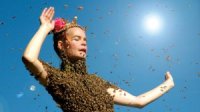
Have you heard the buzz about a new documentary called “Queen of the Sun: What are the bees telling us?“
If you live in or around Los Angeles, you have an opportunity to see this well-received film about honeybees and the mysterious phenomenon of Colony Collapse Disorder beginning this weekend. It’s playing in Santa Monica at the Laemmle Monica and West Hills at the Laemmle Fallbrook 7 from June 17 – 23. If you don’t live in LA, stay up-to-date on theatrical openings near you through the film’s official Web site.
Why should you see a movie about honeybees? Here’s the official description from the film-makers:
Taking us on a journey through the catastrophic disappearance of bees and the mysterious world of the beehive, this engaging and ultimately uplifting film weaves an unusual and dramatic story of the heartfelt struggles of beekeepers, scientists and philosophers from around the world including Michael Pollan, Gunther Hauk and Vandana Shiva. Together they reveal both the problems and the solutions in renewing a culture in balance with nature.
If that doesn’t convince you, the Hollywood Reporter calls the film:
“…a lovely balance between scientific explanation and emotional advocacy…rich subject matter and persuasive presentation make this visually appealing nature documentary worth buzzing about.”
Yup, it’s getting rave reviews from the critics. But more importantly, you should see this movie because for at least the last five years, bee populations have been threatened by Colony Collapse Disorder, which involves the sudden disappearance of most of a hive’s worker bees. This in turn leaves the queen bee and young bees without enough workers to support them.
The disorder is one factor in the growing decline of U.S. honey bees — according to the USDA, an estimated 30 percent of the population is lost each year and some beekeeping operations cite 90 percent losses.
Honeybees are critical to U.S. agriculture, which depends upon them to pollinate 130 different crops, representing more than $15 billion in crop value each year and roughly one-third of the human diet, according to the USDA.
I haven’t yet seen the film, so I don’t know about all of the potential causes for honeybees’ disappearance identified by the filmmakers. However, from the film’s official Web site and in particular its “Take Action” section, it’s clear that pesticides, in particular clothianidin, may be in part to blame for colony collapse.
In doing a little of my own online research on the phenomenon, I also discovered the results of a recent 10-month study by the University of California, San Francisco of healthy honey bees. Scientists identified four new viruses that infect bees, while revealing that each of the viruses or bacteria previously linked to colony collapse is present in healthy hives as well.
Some bee advocates believe that exposure to pesticides weakens honeybees’ immune systems, making them more vulnerable to viruses, bacteria, fungi, and so on–a theory that is consistent with the UCSF findings. Because the colonies in this study remained healthy despite these pathogens, the research supports the theory that colony collapse may be caused by factors working alone or in combination.
For those wondering about the impact of the bees’ collapse on the Golden State, the UCSF press release describing the research findings notes that:
“…for the California almond crop to be successfully pollinated, roughly half of the honeybees in the country — about 1.3 million honeybee colonies — must be in the Central Valley by the first week in February, when the trees begin to bloom. That need is echoed throughout the country, as different crops come due for pollination, resulting in semis traversing the nation for most of the year, each bearing hundreds of hives.”
Clearly, this is an issue that should be important to Californians who care about our environment and our economy. Find out what the bees are telling us. See the film and tell us what you think!

